New records of ants from Sudan Acacia senegal collected by J H Mathews, 2000-1
| The Ants of Africa New records of ants from Sudan Acacia senegal collected by J H Mathews, 2000-1 |
Ants from Sudan Acacia senegal, collected by J H Mathews, University of Oxford, 2000-1
* first record for Sudan
Collection localities (P = Plantation, SNW = semi-natural
woodland); ants were not captured from all plots
Preliminary trials were in Kordofan, El Ain, near El Obeid, in October 2000; location not given but presumably close to the Rahad plantation (examined 040, 059, 072-096)
Rahad Research Area, Kordofan - 12°56' N 30°35' E; Nov-Dec 2000 - 15 P 12 SNW; June-July 2001 - 21 P 18 SNW (examined 4 tubes; 273-281); Sept-Oct 2001 - 21 P 20 SNW (examined 9 tubes; 310-340)
Khordonia, Damazine Plantation, Blue Nile - 11°51' N 34°15' E; Nov-Dec 2000, 17 P 29 SNW; June-July 2001 - 12 P 20 SNW (examined 35 tubes from 222-297); Sept-Oct 2001 - 21 P, 20 SNW (examined 34 tubes from 341-381 & 421-423)
Abu Gmein, Blue Nile - 11°21' N 34°27' E;
Nov-Dec 2000 - 21 P 20 SNW (examined 12 tubes; 115-172);
June-July 2001 - 21 P 21 SNW (examined 7 tubes; 174-217); Sept-Oct 2001
- 20 P 20 SNW (examined 24 tubes; 383-414)
Not seen by BT - Khordonia Nov-Dec 2000
Mathews (thesis, Appendix D, pp 327-8) separated 41 Formicidae
RTUs. Cites 340
samples; with each canopy sample given a single number, although split
into taxonomic groups. [BT comments - almost
irreconcilable; clearly I have not had all the samples; the
Kordofan findings are not in the thesis]
DOLICHODERINAE
Tapinoma
sp 02 (12) [unclear as I have separated two species, from 5 trees]
DORYLINAE
Dorylus sp 01
(Khordonia SNW, 1) [a misidentification as none in the tubes and Dorylus species very rarely, if
ever ascend trees]
FORMICINAE
Anoplolepis sp
01 (7) [possibly a misidentification of Lepisiota gracilicornis as Anoplolepis gracilipes]
Camponotus sp 01
(19); Camponotus sp 02 (Rahad
P, 1); Camponotus sp 03 (Abu
Gmein, 1); Camponotus sp 04
(18); Camponotus sp 06 (Abu
Gmein
1) [the only species I found was Camponotus
sericeus although there are variations in the colour, notably in
the reddishness of the head]
Lepisiota sp 01
(29 trees, common)
Lepisiota
sp 02
(Rahad SNW, 2 trees, 10)
Lepisiota
sp 03 (Khordonia 1, Rahad 1)
Lepisiota
sp 04 (Abu Gmein 1, Rahad 1)
Lepisiota
sp 06 (145 trees, very common)
Plagiolepis
sp 01 (Abu Gmein p, 1 tree, 1; Khordonia SNW, 1 tree, 1; Rahad SNW, 2
tree, 3) [
Plagiolepis
sp 02 (28) [probably Plagiolepis
sudanica and Plagiolepis
brunni combined]
MYRMICINAE
Cardiocondyla sp
01 (Khordonia P, 2 trees, 6; Khordonia SNW, 2 trees, 11; Abu Gmein SNW,
1 tree, 2) [only specimen seen was a single queen]
Crematogaster
sp 01 (Rahad SNW, 1 only) [don't know]
Crematogaster
sp 02 (23) [probably a combination of the smaller Crematogaster (Cr. spp, most
being Cr. acaciae]
Crematogaster sp
03 (Khordonia P, 1 tree, 3) [possibly the Crematogaster (Cr.) senegalensis
Eritrea form]
Diplomorium
sp 1 (Rahad SNW, 1) [possibly a major worker of Monomorium oscaris]
Eutetramorium
sp 01 (Rahad SNW (June-July 2001), 1 tree, 123) [definite
mis-identification but possibly not among the tubes I have seen]
Myrmicinae indet 01 (Rahad SNW, 1)
Leptothorax sp 01 (10 trees,
37) [possibly Tetramorium cristatum]
Leptothorax sp 02 (Rahad P 1,
Abu
Gmein P, 4 trees 8) [probably Nesomyrmex
angulatus]
Monomorium
sp 01 (10 trees, 36)
Monomorium
sp 02 (Rahad, 3 trees, 9)
Monomorium
sp 03 (Abu Gmein 2 trees, Khordonia 2 trees,5)
Monomorium sp 04 (15 trees, up
to
20)
Monomorium sp 05 (Rahad
SNW, 2 trees, 8)
Oligomyrmex
sp 01 (Khordonia SNW 1 tree, 2) [possibly minors workers of Monomorium oscaris]
Pheidole sp 01 (Khordonia 3
trees, 8; Rahad, 1 tree, 5)
Pheidole sp 02 (Khordonia P, 1)
Pheidole sp 03 (Rahad SNW 1 tree,
2)
Pheidole sp 04 (Rahad P,
1) [not in tubes I have had]
Pristomyrmex n sp 01 (Abu
Gmein, 2 trees P, 13; Khordonia P, 1 tree, 3; Khordonia SNW, 1 tree, 3)
[definite misidentifications; I found an example of Plagiolepis brunni labelled as "Pristomyrmex"]
indet sp 01 (Abu Gmein P 1)
indet sp 02 (Khordonia P 1)
indet sp
03 (Abu Gmein SNW 1)
indet sp 04 (Khordonia SNW 1 tree, 3)
indet sp
05 (Abu Gmein P, 1 tree, 2; Rahad SNW, 1)
Species List - 48 species
| SUBFAMILY |
Species |
Image |
| DOLICHODERINAE |
Tapinoma
carininotum Weber JM 042 type location Sudan Kordofan 1 tree (1) Abu Gmein 1 tree (1) Probably JM Tapinoma sp 02, combined with T. luteum |
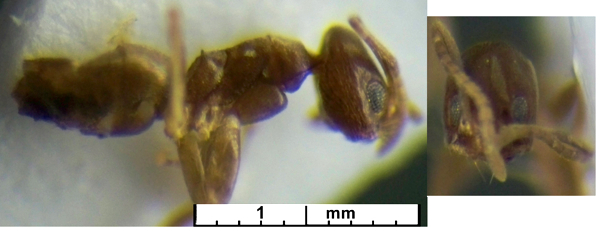 |
| 0DOLICHODERINAE |
Tapinoma
luteum (Emery) JM 330 east and southern Africa * Kordofan 2 trees (2 & 5) Rahad 2 trees (4 & 8) Khordonia 1 tree (1) Abu Gmein 1 tree (2) |
 |
| FORMICINAE |
Camponotus
(Orthonotomyrmex) sericeus (Fabricius) JM 223, dimorphic pan-African, common Kordofan 8 trees Rahad 8 trees Khordonia 14 trees Abu Ghmein once Note there is a colour variation with some having a brighter red head - this may explain the JM separation into four species |
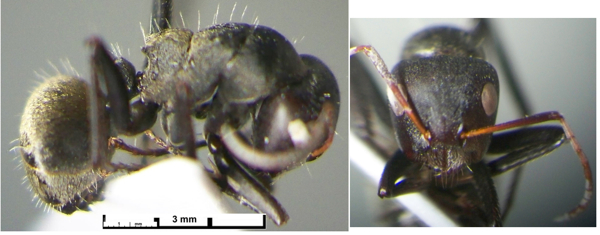 |
| FORMICINAE |
Lepisiota
acholli (Santschi) black form JM 406 (Abu Gmein) Head sub-square; clypeus with a strong median carina/keel; head with a distinct median impressed line, reaching back to posterior level of the eyes; eyes ovoid but quite broad with angled forward edge; abundant long erect hairs (ca 0.17 mm); petiole profile moderately thick with obtuse apex, shorter than propodeal declivity TL ca 2.5 mm, CI 85, SI 127 Matches type description |
 |
| FORMICINAE | Lepisiota acholli (Santschi) brown form JM 341 Kenya & Sudan Khordonia 4 trees (19) Abu Gmein 1 tree (1) |
 |
| FORMICINAE | Lepisiota sp JM 234 head sub-square; eyes relatively large (ca 0.40 X length of side of head) shallowly convex; petiole scale with a narrow profile, as high as the propodeum declivity, weakly bispinose; erect pilosity moderately abundant but distinctly shorter (ca 0.10 mm) than on albata and canescens TL ca 2.6 mm, CI 89, SI 133 Khordonia 1 tree (numerous); label in tube JM "Lepisiota No 3" The description of Lepisiota imperfecta (Santschi), type location Zimbabwe is a close match, notably the relatively short sparser erect hairs and much reduced pubescence, but that had a TL 2.0 mm and was black |
 |
| FORMICINAE | Lepisiota
albata (Santschi) Note polychromic from dark brown-black to dull yellow-brown; JM 372 longer erect hairs (ca 0.12 mm) than JM 234; very thin petiole scale (thinner than Santschi indicates) but squarish head shape matches; eyes relatively large (ca 0.38 X length of side of head) shallowly convex; TL ca 2.6 mm, CI 85, SI 130 Type location Zaire but I have others from Sudan; slightly larger than the type size, TL 2.3 mm. This commonly has colonies containing pale to near albino specimens, contrasting with the dark red-brown to black majority Kordofan 1 tree Rahad 1 tree Khordonia 33 trees Abu Gmein 31 trees |
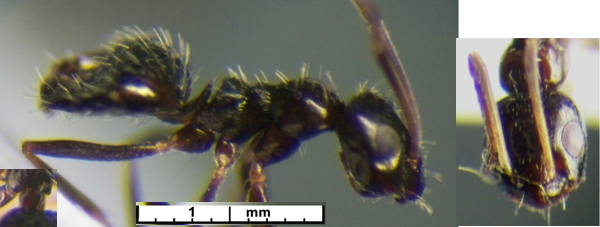 |
| FORMICINAE | Lepisiota
albata colour variation |
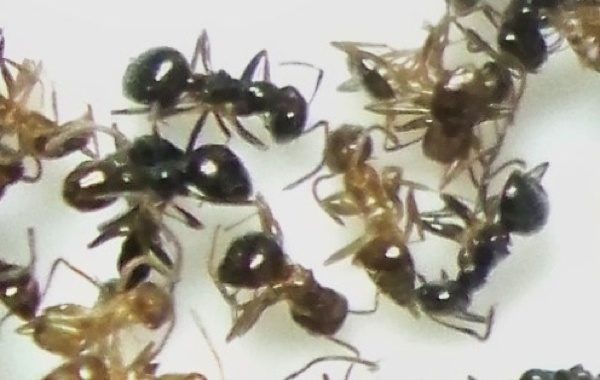 |
| FORMICINAE | Lepisiota
canescens (Emery) JM 402; head sub-rectangular; eyes ovoid and flat (ca 0.33 of length of side of head); quite thick petiole scale, with a barely impressed upper margin; erect hairs yellowish (ca 0.16 mm long); almost completely dark brown-black, tarsi and base of scapes dull yellow-brown TL ca 2.5 mm, CI 77, SI 135 common across Sahel zone Khordonia 3 trees (7) Abu Gmein 4 trees (9); 211 had a label in tube JM "Lepisiota No 3" |
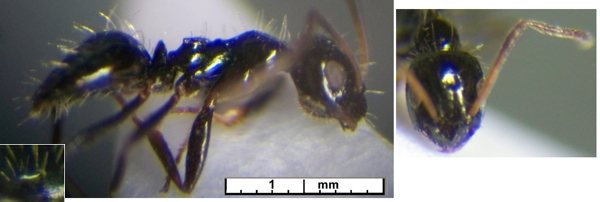 |
| FORMICINAE | Lepisiota
depilis (Emery) acholli
(Weber) JM 351; clypeus with distinctive raised median carina; eyes near flat (ca 0.4 x length of side of head); alitrunk relatively short and stocky, pronotum quite strongly domed; petiole scale weakly bispinose, head narrowed anteriorly but in profile convex on both upper and lower sides; erect hairs moderately long and slender off-white (ca 0.10 mm long). head quite shaggy due to decumbent pubescence; overall uniform dark brown-black type location Somalia; type description has petiole scale effectively unarmed, head, pronotum and mesonotum subopaque. This is shinier but seems a good match for acholli TL ca 2.4 mm, CI 88, SI 124 Khordonia 2 trees (351 only 12; 370 3 plus very many others) |
 |
| FORMICINAE | Lepisiota
foreli (Arnold) JM 073; head near rectangular, with a narrow profile; clypeus with an obtuse median carina; eye ovoid weakly convex (0.37 X length of side of head); petiole scale profile quite narrow, with a sharp apex, very weakly bispinose, unusually narrow seen from above; mahogany, almost no erect hairs except a few very short on gaster TL ca 2.2 mm, CI 82, SI 111 type location Zimbabwe * May not be foreli but generally matches description, small size and colour, here somewhat darker red-brown, alitrunk narrow in dorsal view; limited numbers of pale specimens (callows?), distinctive dull appearance of propodeum Kordofan 6 trees most with 1 ant but one tree (089) with numerous Khordonia 1 tree (1) |
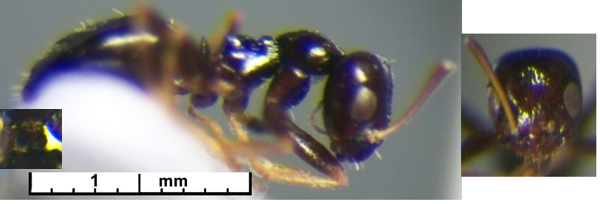 |
| FORMICINAE | Lepisiota
gracilicornis (Forel) JM 040; slender. elongated species, petiole and propodeum with sharp spines TL ca 3.6 mm, CI 75, SI 230 Unmistakeable Horn of Africa species Kordofan 1 tree (1) Rahad 1 tree (1) |
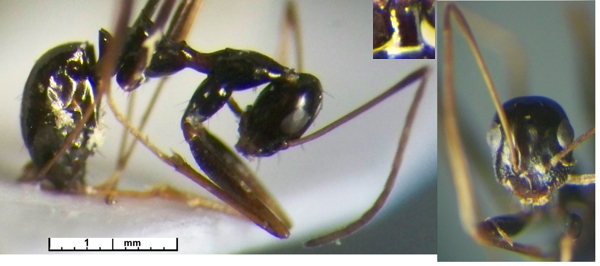 |
| FORMICINAE | Lepisiota
laevis (Santschi) JM 294; head sub-circular, widest at occiptum; eyes in full face view a peculaiar shape, weakly convex (0.34 X length of side of head); short alitrunk and scapes; alitrunk strangely small, short and stocky; petiole scale weakly bispinose. also extremely narrow and small; shiny but head very finely sculptured and submatt; small, very sparse, short hairs (ca 0.07 mm long) on border of gaster segments; very dark brown * TL ca 2.4 mm, CI 89, SI 100 Khordonia 1 tree (1) |
 |
| FORMICINAE | Lepisiota
palpalis (Santschi) JM 174; small, long palps distinctive; head in full face view near circular; eyes large (0.43 x length of side of head); pronotum dorsally flattened; propodeum dorsum with a weak longitudinal septum; petiole bispinose; abundant fine erect yellow pilosity (on gaster ca 0.12 mm long); shiny unsculptured, except lateral mesonotum and propodeum which are very finely spiculate; chestnut to dark brown; antennae wholly yellow brown except for apical segments of funiculus TL ca 2.5 mm, CI 80, SI 138 Abu Gmein 1 tree (5) - rather more brown than others from Sudan. |
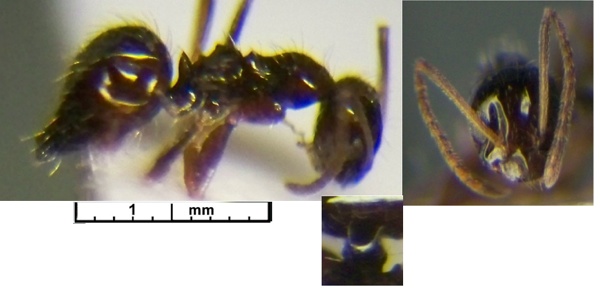 |
| FORMICINAE | Lepisiota n sp JM 154 Head subsquare, with weakly concave occiput; clypeus with quite a strong median carina/keel; eyes large (0.42 X length of side of head) ovoid but shallowly convex; petiole profile moderately narrowed but sharply tapered apically, bispinose; legs unusually long; abundant erect yellowish pilosity (ca 0.12 mm long); shiny but mesonotum and propodeum dull due to fine spiculation; dark brown TL ca 2.9 mm, CI 91, SI 124 Khordonia 1 tree (1) |
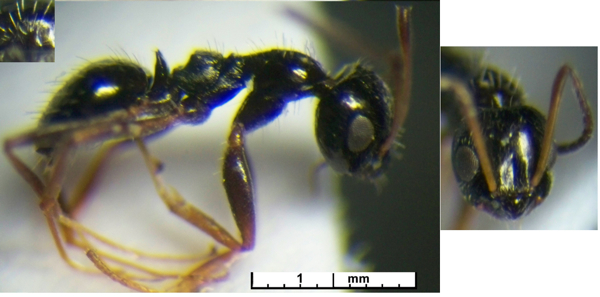 |
| FORMICINAE | Lepisiota n sp JM 352 Head ovoid, with less curved occiput; clypeus with quite a strong median carina/keel; eyes ovoid but strongly convex (0.33 X length of side of head); petiole thick and unusual in being weakly convex apically; abundant erect yellowish pilosity (ca 0.13 mm long); shiny, dark chestnut brown, petiole scale, whole of antennae and most of legs pale orange-yellow TL ca 2.5 mm, CI 75, SI 145 Khordonia 1 tree (2) |
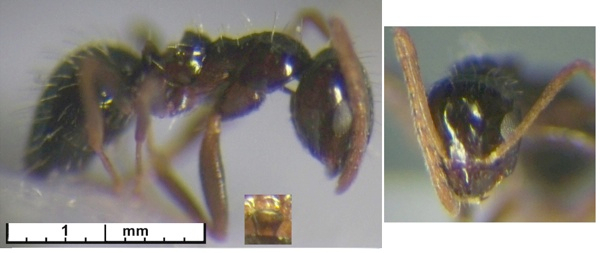 |
| FORMICINAE | Lepisiota n sp JM 094 Small; curiously domed clypeus, which is shiny and lighter coloured than rest of head, base colour mahogany, whole of antenna and lower legs yellow-brown; frons seemingly incaved in all specimens; eyes sub-circular and convex (0.38 X length of side of head); petiole scale weakly emarginate, narrow in profile TL ca 2.0 mm, CI 86, SI 120 Some resemblance to foreli and affinis Kordofan 6 trees (tree 080 (1), 081 (6), 084 (1), 087 (24), 094 (2) & 096 (1)) |
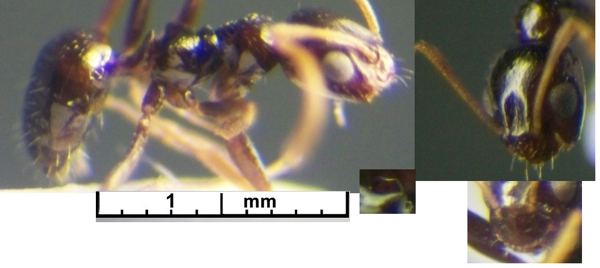 |
| FORMICINAE | Lepisiota
n sp JM IT6 Head sub-circular, in profile also sub-circular; frons with a long median impression; eyes moderate and set more or less on the front of the face, so that hardly breaking outline of sides (0.328 X length of side of head); scape unusually thick and apically widening; petiole scale with quite narrow profile, as high as the propodeal declivity; erect hairs abundant and quite thick (ca 0.12 mm long); base colour dusky yellow to dull yellow-grey, appearance overall is dull TL ca 2.6 mm, CI 89; SI 128 Khordonia 1 tree (1) tube with JM label "Lepisiota 4" Possibly the Santschi (1937d) "Acantholepis capensis Mayr v. subopaciceps n. v." (presently under L. simplex). |
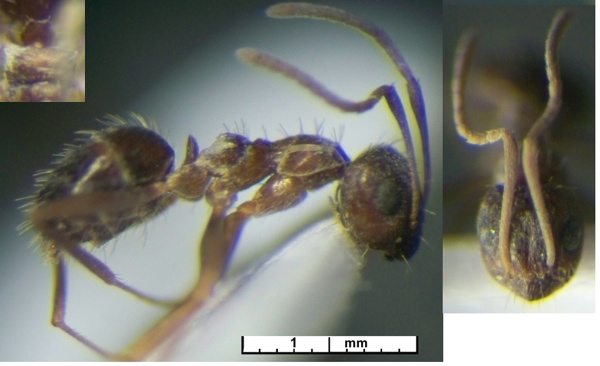 |
| FORMICINAE | Lepisiota n sp JM 362 Very distinctive shiny unsculptured, yellow brown, gaster darker; pronotum dorsally flattened; head sub-square, widest behind the eyes; eyes ovoid moderately convex (0.37 X length of side of head); in profile head sub-circular with broadly convex lower side; clypeus with strong median carina running right to anterior margin; propodeum dorsum with distinctive longitudinal septum; petiole narrow and emarginate apically; abundant erect yellow pilosity (ca 0.16 mm long) TL ca 2.7 mm, CI 90, SI 131 Khordonia 1 tree (6) |
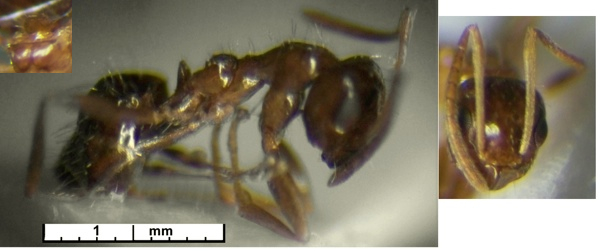 |
| FORMICINAE | Lepisiota n sp JM 093 Head distinctively shaped, sub-rectangular in full face view with sides smoothly convex; clypeus without a median carina; eyes relatively small, ovoid and weakly convex (ca 0.33 of length of side of head); funiculus unusually thick with most segments as wide as or almost as long;' petiole profile moderately thick, as high as the propodeal declivity; orange yellow with a darker gaster (second specimen generally darker); erect hairs extremely short and restricted to posterior margin of gaster segments, plus a few on the front of the head The overall shape, e.g. the distinctive near rectangular head, and the dullish appearance are similar to L. quadraticeps (Arnold) known only from Zimbabwe TL ca 2.0 mm, CI 88, SI 118 Kordofan 1 tree (6) |
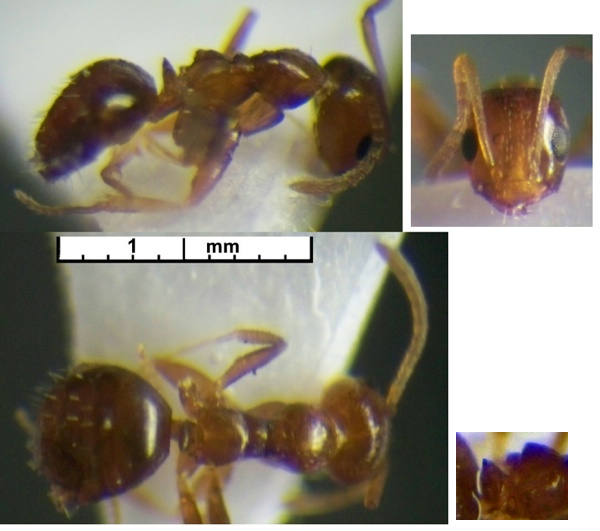 |
| FORMICINAE | Lepisiota
n sp JM 074-02 Small, occiput near straight; eyes almost flat and slightly inset into surface of head, narrow ovoid ca 1.7 longer than wide (0.37 X length of side of head); pronotum shallowly convex; petiole emarginate, moderately thick; sparse short yellow pilosity (ca 0.05 mm); shiny unsculptured, alitrunk yellow brown, head and gaster darker; TL ca 1.7 mm, CI 83, SI 130 Kordofan 1 tree (2) |
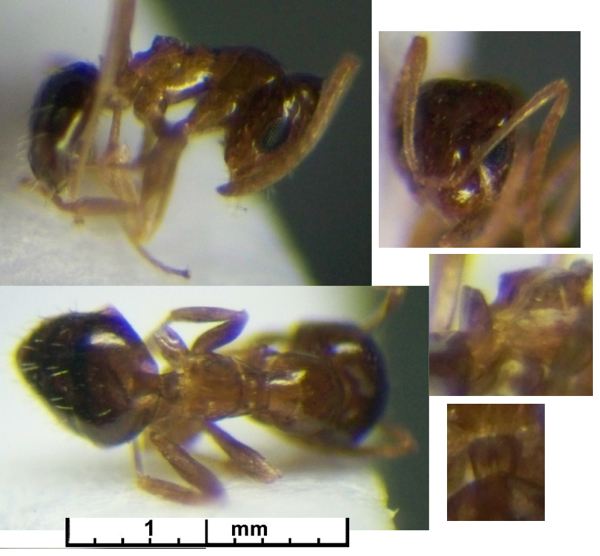 |
| FORMICINAE | Lepisiota
n sp JM 084
(also JM 072) Head sub-circular; eye relatively small, subcircular and flat (0.30 X length of side of head); petiole scale transversely unusually narrow, apex weakly concave, unusual in being slightly higher than the propodeal declivity; erect pilosity very much reduced and very short, ca 0.05 mm; weakly shiny and dull yellow-brown In curta-group of Santschi (1937d), with laevis (see above) TL ca 2.2 mm, CI 85-88, SI 113 Kordofan 2 trees (084 1 & 094 2) |
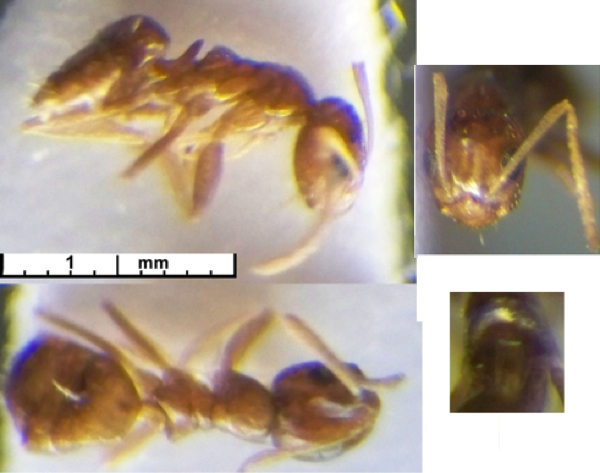 |
| FORMICINAE |
Plagiolepis (Plagiolepis)
brunni Mayr JM 115 Pan-African Khordonia 4 trees (7) [JM "Pristomyrmex"] Abu Gmein 6 trees (12) |
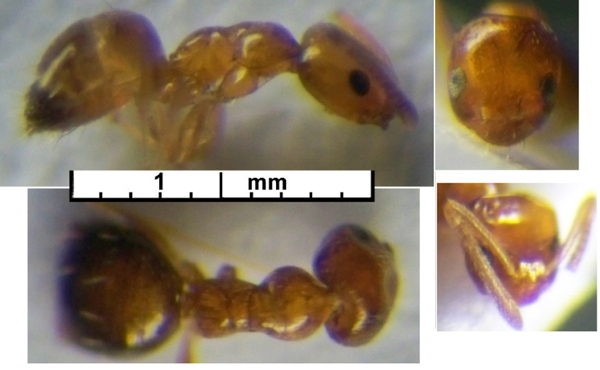 |
| FORMICINAE |
Plagiolepis (Plagiolepis)
sudanica Weber JM 160 matches type description although seemingly slightly lighter Kordofan 1 tree (19) Khordonia 2 trees (4) Abu Gmein 10 trees (12) |
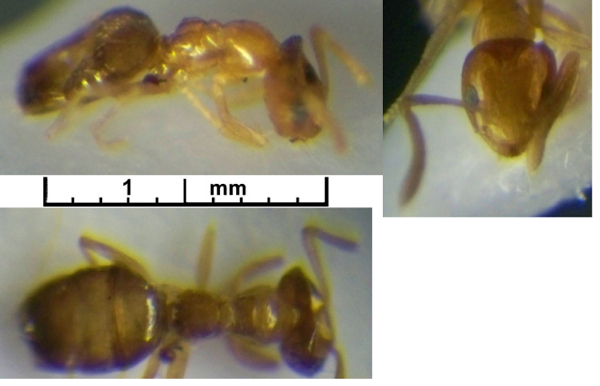 |
| FORMICINAE |
Tapinolepis (Mesanoplolepis)
mediterranea (Mayr) JM 072-01 major type location and only literature record was Egypt; Antweb has a photo of a specimen from Kenya * Kordofan 10 trees (1-20) Khordonia 4 trees (4) JM 289 had a label "Formicinae Plagiolepis" JM 279 had a label "Lepisiota No 4" |
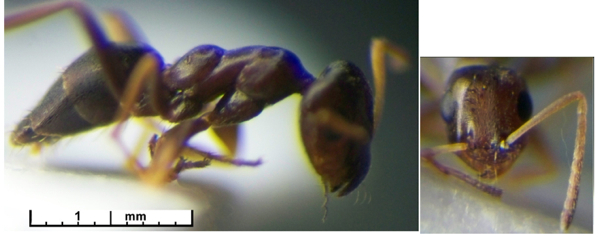 |
| FORMICINAE |
Tapinolepis mediterranea JM 072-01 minor First illustration of minor |
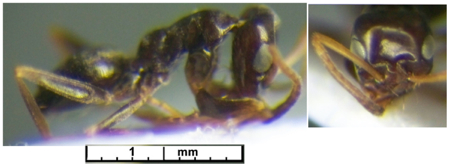 |
| FORMICINAE |
Tapinolepis (Mesanoplolepis)
pernix (Viehmeyer) JM 092 Type location Sudan; matches type description; first illustrations Kordofan 7 trees (1-7) Khordonia 2 trees (2) JM 292 had label "Formicine Acropyga" |
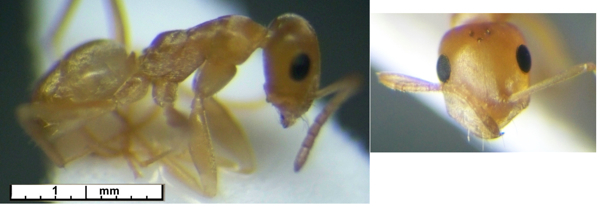 |
| MYRMICINAE |
Cardiocondyla emeryi
Forel, queen JM 115 Pan-African and tramp species Abu Gmein 1 tree (1) |
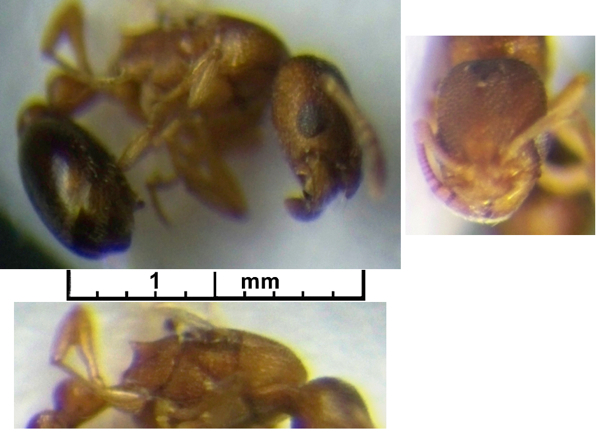 |
| MYRMICINAE |
Crematogaster (Crematogaster)
acaciae
Forel major JM 287 Type location Ethiopia from acacia * Kordofan 3 trees (8-numerous) Khordonia 5 trees (4-numerous) |
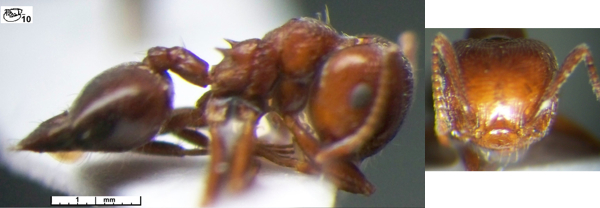 |
| MYRMICINAE |
Crematogaster acaciae
minor JM 287 |
 |
| MYRMICINAE |
Crematogaster (Crematogaster)
castanea F. Smith JM 174 poorly defined and very "variable" species; this matches var. ulugurensis Forel, from Tanzania, finely but densely striate head and alitrunk Khordonia 1 tree (1) Abu Gmein 1 tree (8) |
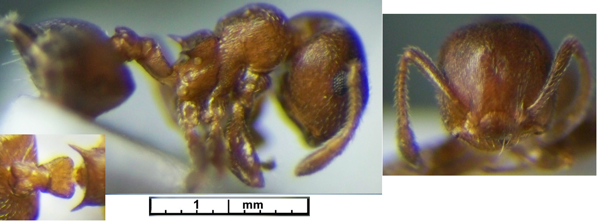 |
| MYRMICINAE |
Crematogaster
(Crematogaster) chiarinii Emery cincta Emery JM 294 The "sub-species" or variety was from Somalia; probably a distinct species as the type form is black and the variety was described as having a brown head, somewhat ferruginous in front, the alitrunk and pedicel ferruginous, the antennae and legs ferruginous-testaceous; the gaster with the base testaceous-yellow and the rest dull brown Khordonia 1 tree (1) |
 |
| MYRMICINAE |
Crematogaster (Crematogaster)
mimosae Santschi JM 172 Type location Kenya, an Acacia inhabitant Abu Gmein 1 tree (150 +) |
 |
| MYRMICINAE |
Crematogaster (Crematogaster)
rivai Emery major worker JM 072 Type location Ganana (Somalia/Ethiopia) from a swollen Acacia spine; close to type description, perhaps somewhat darker but with a distinctive 4-segmented antennal club; scapes thicker than other species * Kordofan 4 trees |
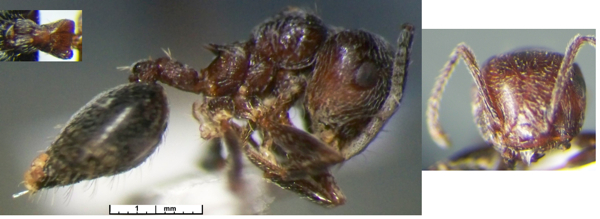 |
| MYRMICINAE | Crematogaster
rivai minima worker |
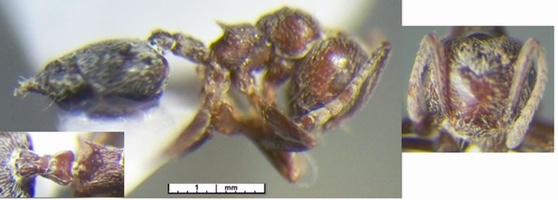 |
| MYRMICINAE |
Crematogaster (Crematogaster)
senegalensis Roger JM 059 Pan-Sahelian species; this matches a type form specimen I have from Niger Kordofan 8 trees (2 trees have numerous workers) |
 |
| MYRMICINAE |
Crematogaster (Sphaerocrema)
chlorotica Emery JM 174 Literature records are from West Africa but this matches the type description and specimens I have from Mali and Benin Abu Gmein 1 tree (1) |
 |
| MYRMICINAE |
Monomorium nsp JM 076 JM 076 Previously known only from the holotype collection in Aden; * first illustration distinctive striated mandibles Kordofan 1 tree (1 only); 24.x.2000 TL ca 3.4 mm, HW 0.71, HL 0.88, CI 90, SL 0.72, SI 102, PW 0.45; eyes ca 0.29 X HW |
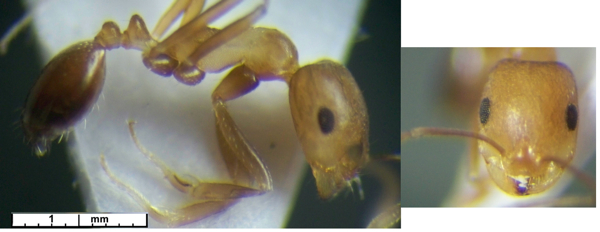 |
| MYRMICINAE |
Monomorium manir Bolton JM 254 Previously known only from the holotype collection in Kenya; from Acacia-Commophila scrub * first illustration Kordonia 1 tree (1) |
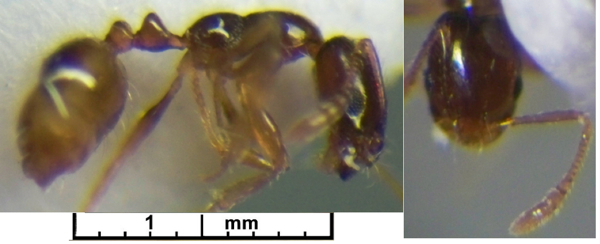 |
| MYRMICINAE |
Monomorium mictilis Forel JM 174 Pan-Sahel species * Khordonia 2 trees (5 & 2) Abu Gmein 2 trees (1 & 1) |
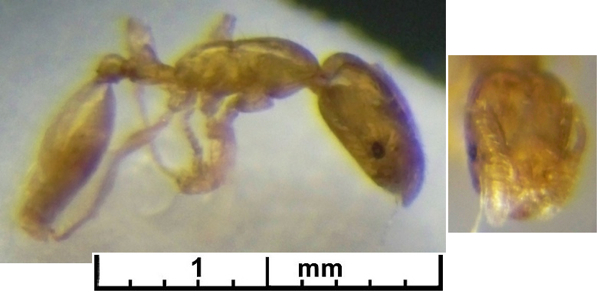 |
| MYRMICINAE |
Monomorium niloticum Emery JM 183 Seemingly primarily North African and up the Nile to Sudan (my records) Khordonia 1 tree (1) Abu Gmein 2 trees (2 & 1) |
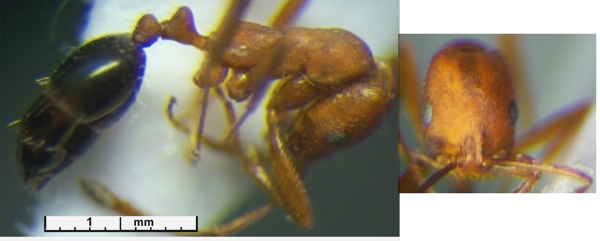 |
| MYRMICINAE |
Monomorium
oscaris Forel JM 093, polymorphic, major shown Pan-African savannah species Kordofan 1 trees (1 & several) Abu Gmein 2 trees (6 & 2) |
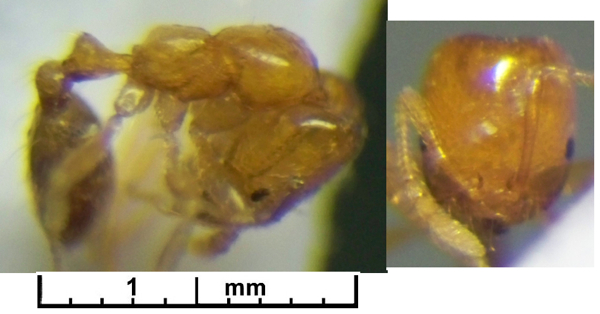 |
| MYRMICINAE |
Monomorium
oscaris Forel JM 040, minor |
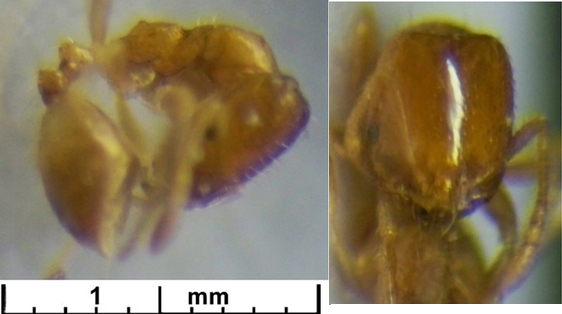 |
| MYRMICINAE |
Monomorium pullulum
Santschi JM 093, polymorphic, major shown Pan-Sahel, type location Senegal, but I have a specimen from Egypt, now these * Kordofan 10 trees (ca 12 on each) Rahad 1 tree (5) Khordonia 2 trees (many & 6) |
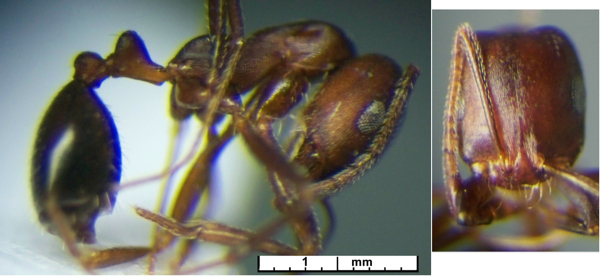 |
| MYRMICINAE |
Monomorium robustior Forel JM 093, polymorphic, major shown East African, type location Somalia * Kordofan 1 tree (1) |
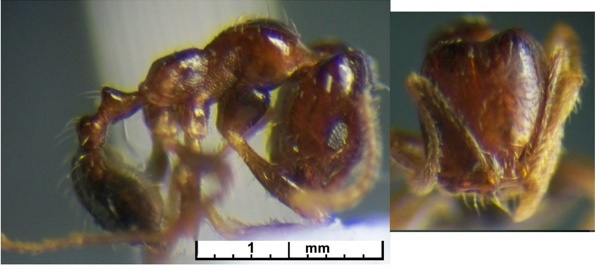 |
| MYRMICINAE |
Monomorium salomonis
(Linnaeus) JM 040 Essentially a North African species Kordofan 1 tree (2) |
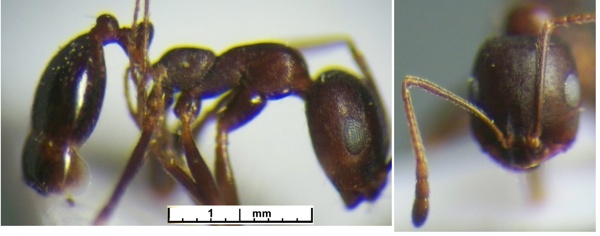 |
| MYRMICINAE |
Myrmicine queen possibly Monomorium
pullulum Santschi JM IT7 Rahad Plantation 1 tree (1) |
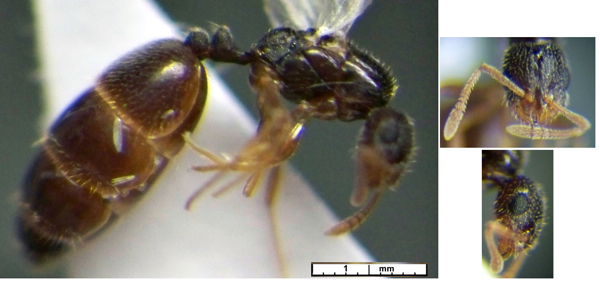 |
| MYRMICINAE |
Nesomyrmex angulatus
(Mayr) JM 174 North Africa - Sahel species matches Egyptian specimens Abu Gmein 3 trees (2, 5 & 8) |
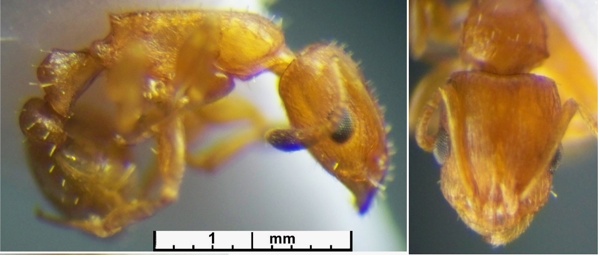 |
| MYRMICINAE |
Pheidole escherichii Forel JM 334; minor type location Eritrea but I have specimens from Sudan Rahad 1 tree (1) |
 |
| MYRMICINAE |
Pheidole
cf prelli JM 226; minor The type location for Pheidole prelli Forel is Kenya; and this is generally darker than the type description of overall yellow-rust * Khordonia 1 tree (1) |
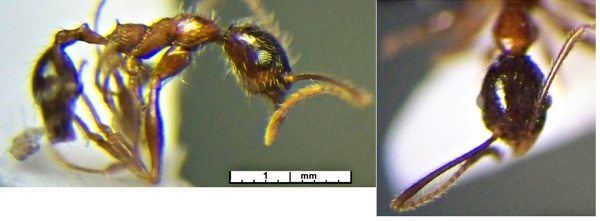 |
| MYRMICINAE |
Pheidole rugaticeps Emery JM IT02; minor type location Eritrea, but a Sahel species Khordonia 1 tree (1) Abu Gumein 1 tree (2) |
 |
| MYRMICINAE |
Pheidole saxicola Wheeler JM 340; minor type location Zaire, I have a specimen from Congo * Rahad 1 tree (1) |
 |
| MYRMICINAE |
Pheidole sculpturata Mayr JM 240; minor type location South Africa, but recorded from Somalia and Kenya * Khordonia 1 tree (2) (first photo) |
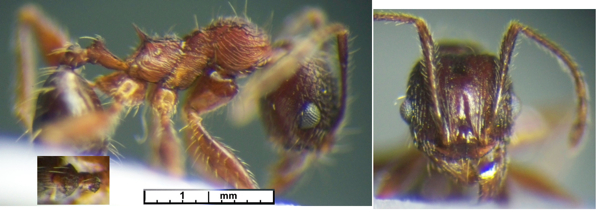 |
| MYRMICINAE |
Tetramorium cristatum
Stitz JM 384 Seemingly a savannah species from right across the Sahel; with relatively few records (first photo) Abu Gmein 5 trees (3, 5, 5, 1 & 1) |
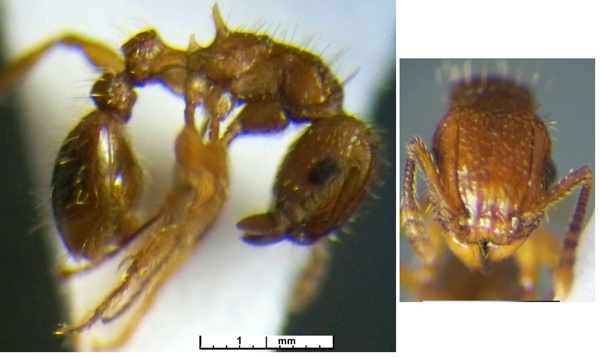 |
|
© 2010, 2015 - Brian Taylor CBiol FSB FRES 11, Grazingfield, Wilford, Nottingham, NG11 7FN, U.K. |
href="new_records_matthews_sudan_species.html"